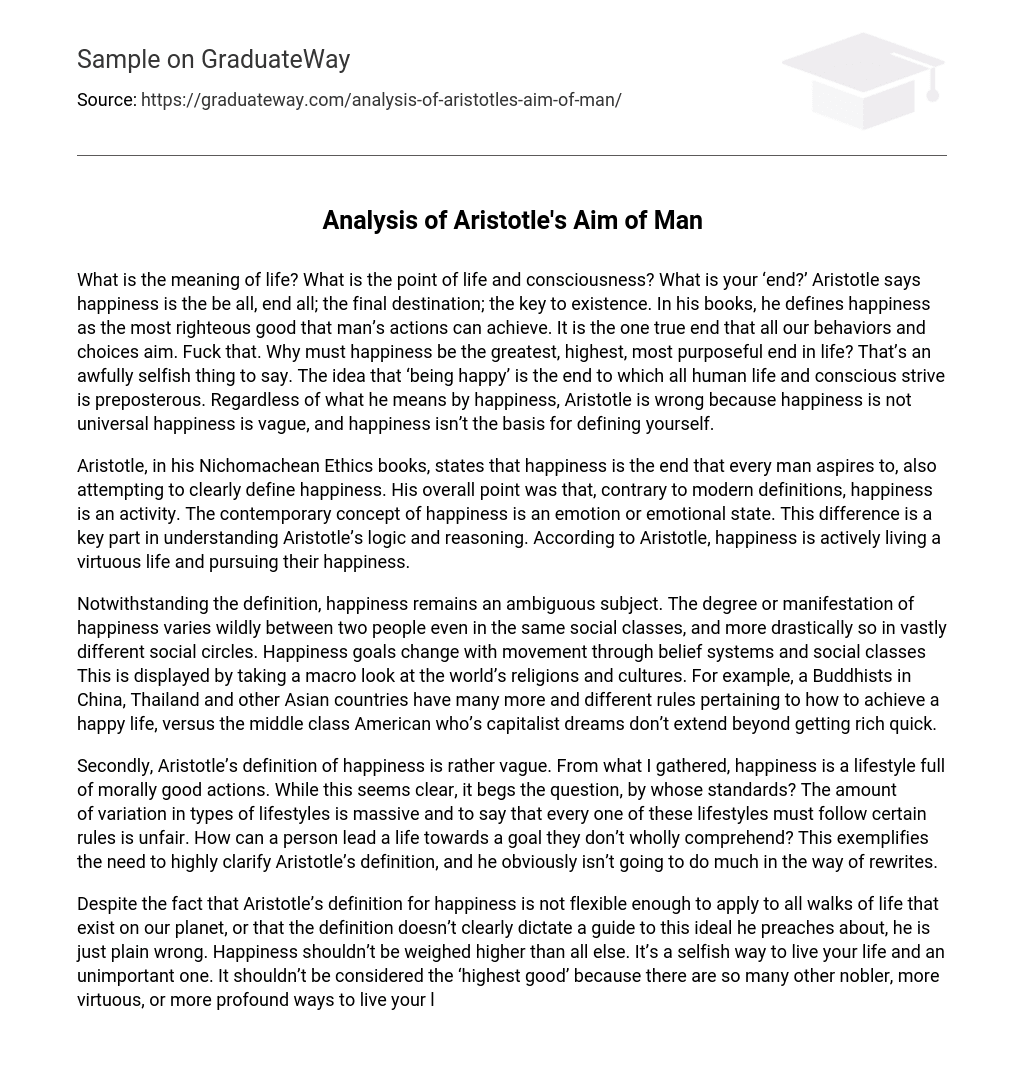What is the meaning of life? What is the point of life and consciousness? What is your ‘end?’ Aristotle says happiness is the be all, end all; the final destination; the key to existence. In his books, he defines happiness as the most righteous good that man’s actions can achieve. It is the one true end that all our behaviors and choices aim. Fuck that. Why must happiness be the greatest, highest, most purposeful end in life? That’s an awfully selfish thing to say. The idea that ‘being happy’ is the end to which all human life and conscious strive is preposterous. Regardless of what he means by happiness, Aristotle is wrong because happiness is not universal happiness is vague, and happiness isn’t the basis for defining yourself.
Aristotle, in his Nichomachean Ethics books, states that happiness is the end that every man aspires to, also attempting to clearly define happiness. His overall point was that, contrary to modern definitions, happiness is an activity. The contemporary concept of happiness is an emotion or emotional state. This difference is a key part in understanding Aristotle’s logic and reasoning. According to Aristotle, happiness is actively living a virtuous life and pursuing their happiness.
Notwithstanding the definition, happiness remains an ambiguous subject. The degree or manifestation of happiness varies wildly between two people even in the same social classes, and more drastically so in vastly different social circles. Happiness goals change with movement through belief systems and social classes This is displayed by taking a macro look at the world’s religions and cultures. For example, a Buddhists in China, Thailand and other Asian countries have many more and different rules pertaining to how to achieve a happy life, versus the middle class American who’s capitalist dreams don’t extend beyond getting rich quick.
Secondly, Aristotle’s definition of happiness is rather vague. From what I gathered, happiness is a lifestyle full of morally good actions. While this seems clear, it begs the question, by whose standards? The amount of variation in types of lifestyles is massive and to say that every one of these lifestyles must follow certain rules is unfair. How can a person lead a life towards a goal they don’t wholly comprehend? This exemplifies the need to highly clarify Aristotle’s definition, and he obviously isn’t going to do much in the way of rewrites.
Despite the fact that Aristotle’s definition for happiness is not flexible enough to apply to all walks of life that exist on our planet, or that the definition doesn’t clearly dictate a guide to this ideal he preaches about, he is just plain wrong. Happiness shouldn’t be weighed higher than all else. It’s a selfish way to live your life and an unimportant one. It shouldn’t be considered the ‘highest good’ because there are so many other nobler, more virtuous, or more profound ways to live your life. The end to all man’s aims should be to better your community, and help your fellow man. At the end of your life you should be judged, not by how happy you made yourself, but by the happiness you brought to others.
Aristotle’s statement about happiness, being the end to all aims, is not the proper and noble way to live your life. It is better for humanity as a whole to live a virtuous and moral life, as Aristotle does say, with the aim of better your community. That’s happiness and morality is about, not making yourself content, but bringing satisfaction and fulfillment to others.





